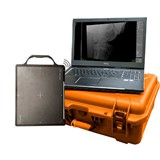An associate professor in molecular and cellular biology, Dr Sudha Rao and her teams are aiming to better understand how cells work at the genetic level in two models: one looking at preventing the spread of primary cancer cells; and the second one to develop better vaccines for influenza and other viruses.
"Both projects are at the verge of making breakthrough discoveries as well as developing new therapeutic strategies, so this funding will ensure this work continues to go forward," Dr Rao said.
Dr Rao and her research colleagues received $571,894 from the National Health and Medical Research Council (NHMRC) for a project in which they have identified two target proteins that — if blocked — can neutralise the cells that spread primary cancer around the body.
"We aim to demonstrate that a combination therapy of chemotherapy plus the inhibition of cancer stem cells could prevent cancer recurrence," she said.
Focusing on breast cancer, which remains the leading cause of cancer-related death in women, Dr Rao has built on previous work which identified a group of cells that are resilient to current cancer treatments and spread the cancer to other parts of the body, called the cancer stem cells, which are also responsible for recurrence.
"There is very little therapy to fight aggressive cancers such as breast cancer and the available treatments are harsh and in many cases, superficial and transient," she said.
"And once they recur, there is no treatment whatsoever. We are determined to fix that."
By looking at how these cancer stem cells are wired up at their gene level and understanding what makes them different to normal breast cells, Dr Rao and her colleagues were able to identify small molecule inhibitors that drugs can specifically target.
"And actually these treatments could also be used in tackling other aggressive cancers such as prostate, ovarian and pancreatic cancer."
For the second project, Dr Rao and her colleagues from the University of Melbourne were awarded $494,169 from the NHMRC and a further $451,000 from the Australian Research Council to better understand the mechanisms of the protective capacity of our immune system and develop more effective vaccination regimes.
"We know little about how vaccinations work at the genetic level and we also need to know more about how viruses, like influenza, impact the immune system to develop more effective vaccines."
Dr Rao said that her team has been looking at the key helping cells in our body, called the T cells, "which are the soldiers who switch on or off to deal with infection and have a memory that guides them on how to act and when to react".
Dr Rao said: "We are interested in this memory and how we can help them arm themselves quickly to fight a new infection.
"Understanding these mechanisms has implications for vaccination and improved immunotherapy strategies for cancer."











-160x160-state_article-rel-cat.png)







